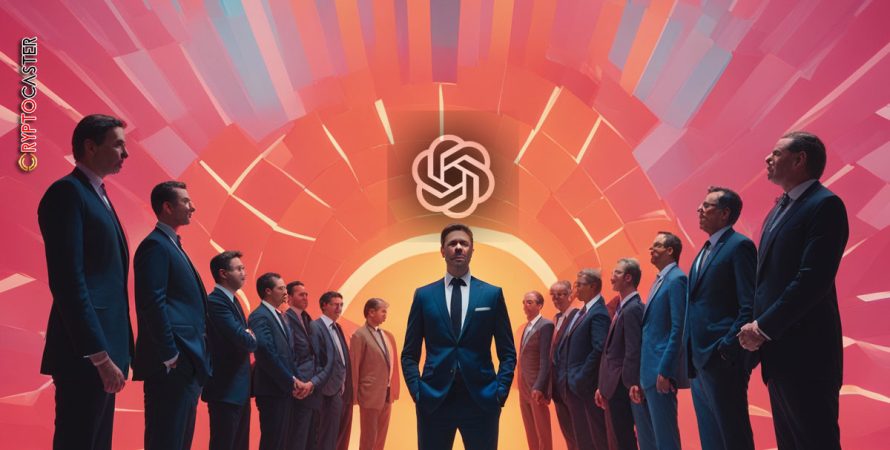- Leading AI startup OpenAI may face legal action from investors as a result of CEO Sam Altman’s abrupt termination, which created internal turmoil and raised worries about financial losses.
- Due to the company’s unusual organizational structure—it was founded as a nonprofit organization before adding a for-profit subsidiary—employees have substantial control over board decisions and investors have few legal options.
The recent turmoil at OpenAI, a pioneer in generative AI, following the board’s abrupt decision to fire CEO Sam Altman, has sparked considerable interest in the technology community. Investors are worried about the possible effects of this action on their large assets, which has prompted them to think about their legal options.
Investor reaction and leadership crisis
There’s been a lot of internal strife since Altman was fired, which some sources claim was due to a “communication breakdown.” Over 700 employees of OpenAI are apparently thinking about leaving the company if the board is not reorganized. Investors’ concerns are mirrored in this internal conflict, as they worry that their financial investments in the massive AI company may be compromised.
Stay in the know on crypto by frequently visiting Crypto News Today
OpenAI’s distinctive organizational structure prioritizes the greater welfare of humanity before investment returns. It started out as a charity before adding a for-profit subsidiary to raise capital. Professor of law Minor Myers explains that this arrangement allows employees greater influence over board decisions than the venture capitalists who have backed the company. As a result, investors are left with little options to address their perceived complaints.
CryptoCaster Quick Check:
Ownership structure and legal environment complexity
It becomes clear from navigating the legal ramifications of this circumstance that OpenAI’s organizational structure is complex. Microsoft owns 49% of the company’s for-profit division, while the remaining 49% are split between different investors and staff. OpenAI’s nonprofit parent corporation owns the remaining 2% of the business. According to law expert Paul Weitzel, this arrangement—which uses a limited liability company framework—might protect the nonprofit’s board from direct investor litigation.
Notwithstanding the investors’ worries, corporate law examples from the past indicate businesses have significant discretion when it comes to important business decisions, such as terminating executives. This legal flexibility also applies to nonprofit boards’ responsibilities, which, despite being strict in some areas, provide them a great deal of leeway in making decisions when serving in leadership positions.
Probable developments
The high-tech sector is closely observing OpenAI’s developments, since they could impact future standards for striking a balance between investor interests and a company’s mission and governance. This is a crucial case for future corporate structuring and investor relations in the tech sector since the possible court struggle, if it proceeds, might redefine the limits of investor rights and corporate governance within creative innovation companies.![]()
We hope you appreciated this article. Before you move on, I was hoping you would consider taking the step of supporting CryptoCaster’s journalism.
From Elon Musk, Larry Fink(BlackRock) to Jamie Dimon(JP Morgan Chase) a number of billionaire owners have a powerful hold on so much of the hidden agendas’ which eludes the public concerning the paradigm shift juxtaposed by cryptocurrency and web3 emerging technologies. CryptoCaster is different. We have no billionaire owner or shareholders to consider. Our journalistic efforts are produced to serve the public interest in crypto development and institutional disruptions – not profit motives.
And we avoid the trap that befalls much U.S. and global media – the tendency, born of a desire to please all sides, to engage in false equivalence in the name of neutrality and retail consumer protection. While fairness and transparency dictates everything we do, we know there is a right and a wrong position in the fight against fiat global banking interest and monetary reconstruction precipitated by the emerging crypto ecology.
When we report on issues like the FTX, Binance and Ripple crisis, we’re not afraid to name who or what is uncovered. And as a crypto sentinel, we’re able to provide a fresh, outsider perspective on the global monetary disruption – one so often missing from the insular American and European media bubble.
Around the world, readers can access the CryptoCaster’s paywall-free journalism because of our unique reader-supported model. That’s because of people like you. Our readers keep us independent, beholden to no outside influence and accessible to everyone – whether they can afford to pay for news and information, or not.
We thankyou for the on-going support our readers have bestowed monetarily. If you have not considered supporting CryptoCaster, if you can, please consider supporting us just once from $1 or more of Bitcoin (satoshi) or Eth, and better yet, support us every month with a little more. Scroll further down this page to obtain CryptoCaster’s wallet addresses.
Thank you.
Kristin Steinbeck
Editor, CryptoCaster
Please Read Essential Disclaimer Information Here.
© 2024 Crypto Caster provides information. CryptoCaster.world does not provide investment advice. Do your research before taking a market position on the purchase of cryptocurrency and other asset classes. Past performance of any asset is not indicative of future results. All rights reserved.
Contribute to CryptoCaster℠ Via Metamask or favorite wallet. Send Coin/Token to Addresses Provided Below.
Thank you!
BTC – bc1qgdnd752esyl4jv6nhz3ypuzwa6wav9wuzaeg9g
ETH – 0x7D8D76E60bFF59c5295Aa1b39D651f6735D6413D
MATIC – 0x7D8D76E60bFF59c5295Aa1b39D651f6735D6413D
LITECOIN – ltc1qxsgp5fykl0007hnwgl93zr9vngwd2jxwlddvqt
CRYPTOCASTER HEATMAP








